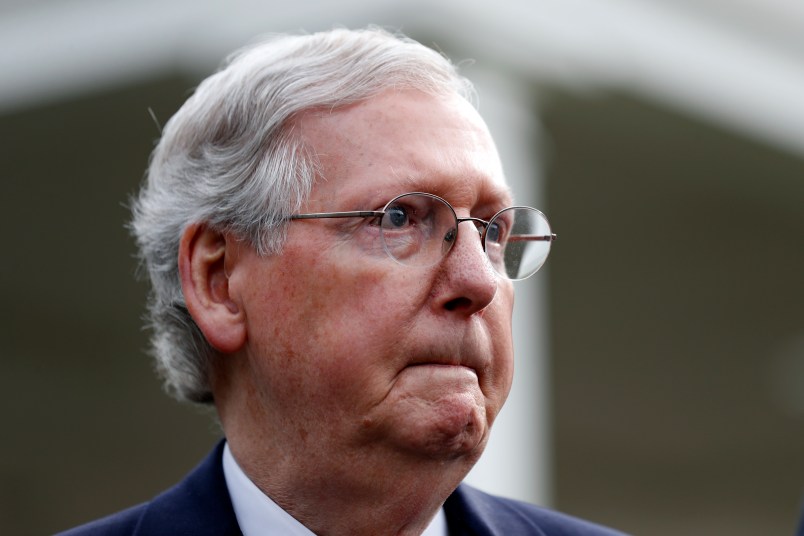After seven years of promising to repeal and replace Obamacare — and about seven months laboring on an Affordable Care Act replacement— Majority Leader Mitch McConnell said Tuesday that Senate Republicans were unable to come up with enough votes to pass their repeal-and-replace legislation at this time. Instead, McConnell said, they would vote “sometime in the near future” on a so-called straight repeal bill, akin to the bill Republicans in Congress passed in 2015 that was vetoed by then President Obama.
“As of today we simply do not have 50 senators who can agree on what ought to replace the existing law,” McConnell told reporters after a private Senate GOP lunch. “What we do have is a vote that many of us made two years ago—at a time when the President of the United States would not sign the legislation—that would repeal Obamacare, and, with a two-year delay, give us the opportunity to build something better on a bipartisan basis.”
It is expected that even the procedural vote to bring up a version of the 2015 bill will fail, as Sens. Sens. Lisa Murkowksi (R-AK), Susan Collins (R-ME) and Shelley Moore Capito (R-WV) have already said they would vote against advancing it to the floor.
Nonetheless, McConnell and other Republicans on the GOP leadership team signaled that they wanted to put Republicans on the record for or against legislation that a vast majority of them approved of when they knew Obama would veto it.
“We need to find where the Senate is, and move forward,” Sen. Roy Blunt (R-MO) said.
The 2015 legislation would repeal the Obamacare taxes immediately, while dismantling its tax credits and Medicaid expansion on a two-year delay. It would leave Obamacare’s regulatory regime in place, which experts and the CBO believe would result in greater coverage losses than the various iterations of the Republican replacement plan lawmakers considered this year.
Other members of the GOP Senate leadership team on Tuesday went through the same series of anti-Obamacare talking points that have become routine at their weekly post-lunch press conferences as Republicans struggled to coalesce around a plan. Yet the frustration that they had failed was palpable.
“There are a lot of people out there today who seem to be today spiking the football, trying to celebrate a moment that for now seems to leave the Affordable Care Act in place today. But let me tell what happens when you continue to spike the football,” Sen. Cory Gardner (R-CO) said, before rattling of his criticisms of how the ACA has affected his state.
“If you live in the eastern plains, on the western slope, you’re going to pay 30 percent more, 40 percent more. That’s spiking the football on the American people who will continue to pay more under the Affordable Care Act that is collapsing,” Gardner said, his voice raising.
Since beginning in earnest work on their version of the House repeal bill, the American Health Care Act, in May, Senate Republicans have appeared unable to bridge the gaps splitting their caucus on major questions in health care reform, such as how many of Obamacare’s market reforms to leave in their plan, how to pay for their replacement, and whether to phase out its Medicaid expansion. The decision to include a massive Medicaid overhaul that would gut the traditional program also proved to be a flashpoint for GOP senators.
President Trump, meanwhile, kept the repeal effort at an arm’s length and never engaged in the specifics of the policy debates at hand. His public comments on the effort often left Republicans feeling confused or even betrayed, and it appears that his private lobbying also fell short.
The Senate version of the House bill was finally unveiled in mid-June after a secretive process that left even members of the ostensible health care working group in the dark. McConnell delayed a vote on it once, before the July 4th recess, when it did not have enough votes to pass. A revised bill was unveiled last Thursday, after another round of negotiations, but again, McConnell failed to win the 50 out of 52 GOP senators needed. By Monday night, four Republicans said they planned to vote against it, leading McConnell to first announce the straight repeal plan Monday night.
The original Senate bill, the Better Care Reconciliation Act, would have resulted in 22 million fewer people having coverage by 2026, the Congressional Budget Office found. The 2015 legislation that McConnell will use as a model for this week’s vote would result in 32 million people losing coverage, the CBO has said.







They seem so tired of all this winning.
Impotent and sad just like the occupant. If you are going to do nothing, in Trump world it better be a great, big, tremendous nothing. #americaintheshitter
So much chinning…I mean, WINNING!
The question of the day is why? Mcturle is a lot of things dumb isn’t one of them. What’s the endgame here?
wtf, McConnell?
is he just trying to punish the “moderates” now?